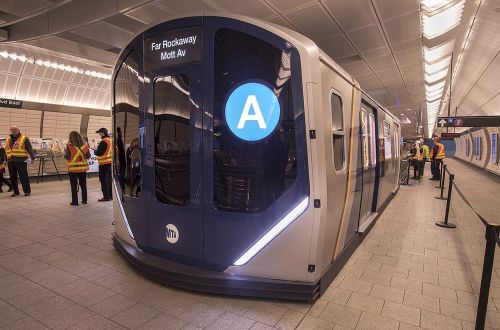Kawasaki’s final negotiated price was $US 1.44bn for the base order for 535 vehicles, with an offer of $US 1.33bn for an initial option for 640 cars and $US 913.57m for a second option for 437 cars. The total price of $US 3.69bn is 18% lower than MTA’s original estimate of $US 4.48bn.
The base order comprises 440 closed-gangway and 20 prototype open-gangway cars for the ‘B’ Division and 75 closed-gangway cars for the Staten Island Railway.
The number of open-gangway cars in the base order has been increased to enable multiple tests to be conducted on a parallel timeline and therefore accelerate the acceptance of open-gangway cars. If tests are successful, all cars from the initial option could be delivered in open-gangway configuration.
Alongside the bid from Kawasaki, a second offer was submitted by R211 Partners, a joint venture of Bombardier Transit Corporation and CRRC MA. However, the selection committee unanimously ruled that the R211 Partners proposal did not meet the minimum requirements of the technical evaluation criteria.
In a staff summary, MTA says it was also concerned by Bombardier’s performance on the current contract for R179 subway cars, which were delivered more than two years late.
Kawasaki’s proposal “met, and in some cases exceeded NYC Transit’s requirements,” and “demonstrated a thorough understanding of NYC Transit’s operating environments and needs. MTA praises Kawasaki’s performance in the delivery of the R160 and R188 fleets, which have achieved high levels of reliability.
MTA says the R211 order calls for “the most aggressive delivery of prototype cars of any NYC Transit subway car contract,” with the delivery of the first 10 pre-series closed-gangway cars due to take place within 10 months of Notice of Award (NOA).
Delivery of production closed-gangway vehicles will take place between 44 and 67 months of NOA. The Staten Island fleet will be delivered between 56 and 65 months of NOA.
The new cars will replace R42 cars dating from1969-70, and some R32 cars, which are more than 50 years old.
The contract will comply with the newly-revised Federal Transit Administration Buy America rules, which require 70% domestic content. Kawasaki and its subcontractors have committed to providing 470 US jobs in the base award, with a total estimated value of $US 125m.
Kawasaki has also agreed to provide a double warranty on braking and HVAC systems at no additional cost to NYC Transit.
New features
As well as introducing full-width gangways to the New York subway for the first time, the R211s will come equipped with a number of other new features including CCTV, crash energy management, flexible passenger information and advertising displays, and wider doors. The new trains will also feature passenger Wi-Fi, USB passenger information sockets, illuminated door opening alerts LED headlights, and larger cab windows.
Design concepts for the R211 were developed by Antenna Design with CH2M acting as engineering consultant on the project.


